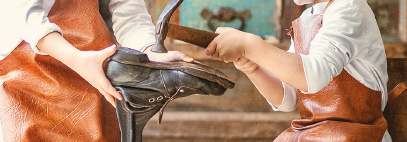A Life I Can’t Imagine For My Son: Shoe Maker
“You’re still a child, Derrick. Your main priorities should be school, and fun – not work!”
I was talking to my 15-year-old son. His after-school job was creeping up in hours. I was worried about his sleep and his schoolwork. He hadn’t played soccer with his friends in two weeks.
Here in Canada, we know the importance of protecting children, so they have a chance to be children. But in many parts of the world, a child at Derrick’s age would already be working 12-hour shifts through pain, exhaustion, and abuse. Let me introduce you to a child whose life I can’t imagine for my son. His name is Jatin. He was meant to work for just a little while, until his father recovered from illness. But that was four years ago. Jatin’s dream of school got fainter with each passing year, until it disappeared completely.
Thirteen-year-old Jatin now toils alongside his father, making shoes. They work in a factory in someone’s home. Jatin’s work consists of cutting, stitching, and gluing the leather pieces. His hands ache constantly. The shop is one of many that exist in the city of Agra, known for the world-famous Taj Mahal mausoleum. Many of Jatin’s shoes find their way to nearby markets, where tourists go to shop. It’s easy to picture the travelers, celebrating the deals they’ve scored on beautiful pairs of hand-made leather shoes. Perhaps they don’t know about Jatin, and other children like him.
The factory where Jatin labours is anything but safe, with heavy machinery and sharp tools lying everywhere. The boss hovers nearby, ready to shout when his young worker slows. “The manager scares me when he yells at me for not doing my work properly,” says Jatin. “There are days I don’t want to go to work. But then I know that if I don’t, we won’t have enough money for food and rent.”
I think about this 13-year-old boy, hunched on the floor, making shoes his family can’t afford to buy. I feel sorrow – and a sense of outrage. Jatin came into the world with a wealth of potential. Who knows what he might have become? Jatin shouldn’t have to give up both his childhood and his future, just to help his family get by.
For his pain and sacrifice, Jatin helps his father accumulate a total of $50 a week. Here in Canada, my son earns that much in a single evening. But Derrick is saving for a new cell phone. Jatin is saving for next month’s rent.
We could blame the tourists who buy Jatin’s shoes, reveling in the low, low prices. But then, we’d need to look at our own shopping habits. Where do the shoes that we purchase from our local mall originate? Was there child labour in their making?

